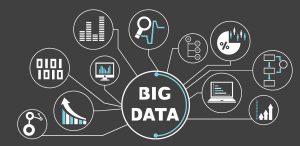Big data and any major technological change have the potential to send shivers down the spines of key players across the board. CDs are becoming increasingly irrelevant, your kids will look upon VHS tapes as some ancient artifact and one could argue that there is no longer room for DVDs in this ‘Netflix-and-chill’ ridden world.
The publishing industry, however, seems to have stood the test of time. While eBooks and eMagazines have become increasingly popular, they haven’t become an outright replacement for a good old-fashioned hard copy – they are merely an alternative (albeit an increasingly favored one). With this in mind, publishers simply cannot ignore society’s intense progression into the digital landscape, as 26% of consumers prefer digital publications to their print counterparts, and the entire industry is set to be worth $1.4 billion dollars by next year.
To quote the brilliant and hauntingly accurate Bob Dylan, “The times they are a-changin’.”
What is big data?
Big Data is a prime example of this sentiment, as it is undeniably going to have a major impact on this industry over the course of the next few years. Publishers now have access to massive amounts of data (thank-you internet!) which can and in fact should affect the way you market, publish and gauge your readership.
Trying to understand and compile all of the data that comes from the digital world, such as web behavior or interaction on social media, is undeniably daunting. The mere thought of that colossal amount of information even existing is pretty terrifying, let alone the task of accurately interpreting it. Once you wrap your head around it however, big data is going to be your new best friend.
As long as your company has some form of online engagement, you will have subsequent data for you to analyze and utilize in the continued growth of your business. This data isn’t limited to purchases or direct engagement. Rather, it goes beyond this to provide you with insight into more nuanced information. This can include how people are talking about your business on the host site as well as on social media. While it can be pretty easy to ignore a negative comment on a Facebook page – because, “what do they know, right?” – that information is precisely what you need to further your business. A huge 50% of people are sharing news or events on social media, with a further 46% discussing these events. Every tweet, every Instagram tag, every Facebook comment, factors into dealing with big data, and if you’re serious about moving forward, it can’t be ignored.
Why big data’s relationship with digital publishing might need to change
It would be fair to surmise that the reason digital publishing is running a bit late to the big data party is because publishers are hesitant to embrace such a massive amount of information. A lot of publishers are using behavioural advertising in which ad systems learn about what any given individual searches for on the Internet – links that are clicked, time spent on various websites and so on. Big Data looks at the market in a broader sense, not rendering behavioural advertising irrelevant, it just has a new sidekick.
We’re living in a world where good content and clever/unobtrusive advertisements just aren’t enough. Big data is the missing ingredient that will help us move from print to digital smoothly, and allow our audiences to grow. Every individual is constantly connected, and through those connections, we can cut costs and make faster decisions in order to keep up with the consumer. By adapting and thinking bigger, using all of the tools at our disposal, our industry will flourish just as many others have as a result of big data.
Some publications have already used big data in genius ways
While some companies have been reluctant to take the plunge into the scary world of big data, some have taken that ball with open arms and run with it.
BBC is arguably the largest media company in the UK and one of the most recognized and respected media empires in the world. The latest figures show that they reach an absolutely colossal 348 million people worldwide every week. The amount of data the BBC must receive each day is the stuff that dreams are made of. As early as 2010, the media powerhouse came to realize exactly how important big data would be.
For the duration of the 2010 FIFA World Cup, BBC’s online coverage required over 1000 individual pages to cover 32 teams, 8 groups, and 700+ individual player pages, which to have undertaken and succeeded in doing is a massive feat in itself. When the Olympics came around, however, they realized the number of individual pages they would need to be made the World Cup seem like a Sunday stroll through the park.
Their solution was, indeed, genius. They scaled everything up by using linked data – which essentially just means creating links between data points within documents as opposed to the documents themselves – while using really simple metadata – the data about your data. This move ended up working brilliantly for the BBC, as they drew in over 9.5 million visitors per day. What’s even more impressive is that they generated a peak of 2.8 petabytes of data, which equates to 2,800 terabytes, which is an almost unbelievable amount. The connection between that usage of big data and the number of visitors the website was drawing in was by no means a coincidence and a prime example digital publication leaning into the future.
What digital publishing can learn from other industries
As mentioned before, mediums such as music and television have been using data management platforms to gather what their audience is interested in. Not only is this used for advertisements, but it can also be used to tailor an individual consumer’s experience when engaging with the product, service or page.
Take Spotify for example. For those familiar with the streaming service, you’ll probably recognize a playlist called ‘Discover Weekly.’ This takes the data that comes from what you’ve been listening to via the service, as well as what others have been listening to that have similar taste or listening patterns, and collates it all to create a completely new playlist at the beginning of every week. You might not like every song on the refreshed playlist, but that doesn’t matter to the folks at Spotify. While they will try to get this playlist as accurate as possible; what really matters to them is that you’re clicking/tapping on it. By opening the playlist, and even checking out only one or two songs, you’re giving them more data and allowing them to further hone their service and thus, grow their business.
As is the case with every other business, the more a company knows about their customers, the better. But that can’t just be limited to the content people consume, we need to know how they are consuming it on a massive scale, the bigger the better. Knowing what content works and what doesn’t is, of course important, but if all we know is how much content people are consuming and through which outlet, we are not innovating – it is the time of the ‘how’ as well as the ‘why’. What is really crucial in all of this is being able to aggregate this data and use it to gain insight to make beneficial decisions in the future. Big Data is the ultimate measurement tool, and while the term may bore you to tears, and its meaning even more so, if we simply ignore it then this industry could die a tragic death at its own hands.
So, what’s next for the relationship between big data and digital publishing?
Even when you consider all of the different factors mentioned above, it is still relatively difficult to pinpoint a trajectory for which big data analytics is going to take digital publishing. What isn’t difficult is acknowledging the huge insights that big data has to offer in regards to consumer behavior. Here are a couple of practical benefits to big data usage:
- It can take the hassle out of sales aggregation and tracking. One of the more tedious aspects of working in marketing in this industry is trying to collate all your sales data from the myriad of different sources and then subsequently having to spend hours reconciling the information into reports. With big data, it’s feasible that all those reports could be collated into one. A benefit to this is that one would have more time to refresh that report on a more frequent basis, by using a sales report dashboard – they exist and will do wonders for you.
- These sales report dashboards could also help you in convincing advertisers that their marketing ROI will be more measured and effective – coaxing ad-spend just got a whole lot easier.
All in all, big data may seem a bit daunting and tedious, but in reality, it’s a big friendly giant that just wants to help you out – and like it or not, it’s coming to the Digital Publishing industry.









